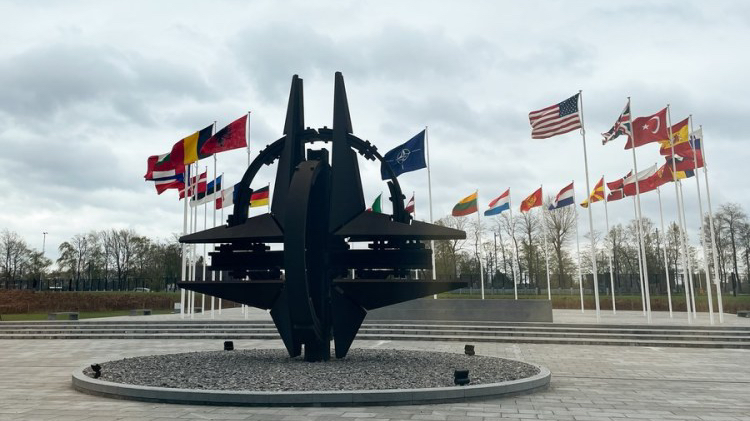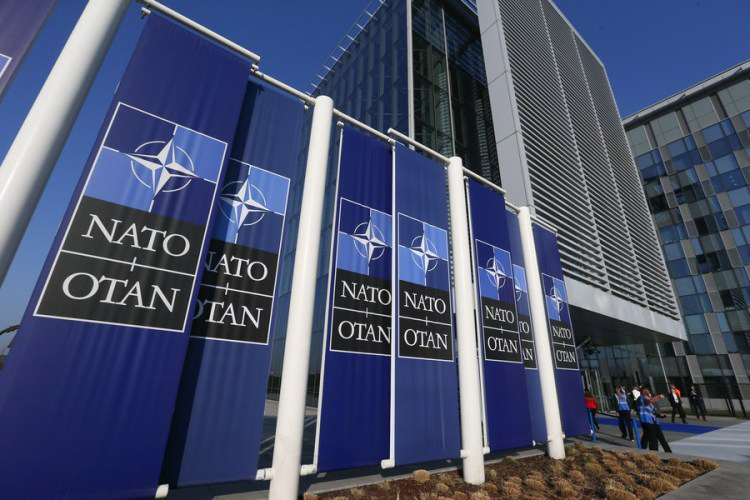
A sculpture and flags at NATO headquarters in Brussels, Belgium, April 6, 2022. /Xinhua
A sculpture and flags at NATO headquarters in Brussels, Belgium, April 6, 2022. /Xinhua
Editor's note: Hannan Hussain is a foreign affairs commentator, author, and assistant research associate at the Islamabad Policy Research Institute. The article reflects the author's opinions and not necessarily the views of CGTN.
On April 4, Finland formally joined the U.S.-led North Atlantic Treaty Organization (NATO) as its 31st member, effectively ending its trademark military non-alignment posture. "Finland is safer and NATO is stronger with Finland as an Ally. Your forces are substantial and highly capable," hailed NATO Secretary General Jens Stoltenberg. The bloc's perilous expansion sends a profound message on undercutting peace priorities, threatens regional escalations with Moscow, and promises to compound Europe's quest for sustainable security.
Considering the implications of NATO's enlargement, the move is designed to promote a perilous trajectory of eastward bloc expansion, evidenced by a nearly two-fold increase in NATO's troubled border with Moscow. This deliberate push to heighten threat perceptions vis-à-vis Russia is consistent with critical security concerns that NATO refused in the lead-up to the Ukraine conflict.
Moreover, expansionist tendencies reinforce NATO's open disregard for collective security of all states – a Cold War holdover. It took considerable pressure from Washington to ensure that resistance to Russia was treated as a bloc imperative for long. These political and hegemonic overtones debunk the impression that eastward expansion is about "every nation" having the right to "choose its own path."
With military hegemony as the dominant motivation, it is also clear that NATO will stop at nothing to jeopardize regional security. Despite substantial costs incurred by Europe through NATO's adventurism in Ukraine, the bloc continues to insist on more wartime rhetoric to justify its high-risk expansion. What about NATO's leading role in widening trust deficit with Moscow, and exacerbating regional tensions further?
NATO's decision to persist with such trust deficit is important because a similar trend marked its contribution to an avoidable conflict in Ukraine. The bloc's refusal to change course through Finland means adding to Europe's unprecedented economic exigencies, making it difficult to rethink structures that advance a truly sustainable European security architecture.

Staff members work at the NATO Headquarters in Brussels, Belgium, March 24, 2022. /Xinhua
Staff members work at the NATO Headquarters in Brussels, Belgium, March 24, 2022. /Xinhua
The world is witnessing NATO's promotion of absolute security and offensive military capabilities under the pretext of transatlantic defenses. An enlarged NATO will not end the conflict in Ukraine, given NATO's stake in tens of billions worth military aid, and a heavily invested defense-industrial complex.
Furthermore, negating Russia's concerns on eastward expansion, and pushing Finland to strengthen its military hand, is the exact opposite of bringing Europe's strategic freedoms to the fore. "Helsinki's policy of military non-alignment had long served Finnish national interests and was an important factor of confidence-building in the Baltic Sea region and the European continent as a whole," cautioned the Russia Foreign Ministry.
Without doubt, Finland's accession will be used by the bloc to generate false expectations about broad-based internal unity. Many divisions are clear as day. That includes Tuesday's gathering of NATO foreign ministers, where key countries remained resistant to prospects of sustained enlargement.
Moscow's stance that it has no choice but to contemplate "counter-measures" in response to Finland's NATO membership is also a legitimate reaction from any sovereign state.
After all, deep uncertainty surrounds NATO's provocations along the 1,300-kilometer Russia-Finland border. Similarly, NATO has flirted with prospects of eastward military deployments and infrastructure in the past, meriting Russia's territorial vigilance and regional alarm.
Understand that while NATO expands, part of the world stands focused on easing tensions between Russia and Ukraine and stemming protracted unrest. For this reason alone, NATO's push for domination fails to assure Russia that confrontation risks are a far cry. Moscow has been clear about the need to strengthen its military divisions stationed in its west and northwest if "the risks of a significant expansion of conflict" appear likely.
NATO's enlargement delivers a striking validation of those risks and represents one bloc's push to expose the world to further insecurity.
(If you want to contribute and have specific expertise, please contact us at opinions@cgtn.com. Follow @thouse_opinions on Twitter to discover the latest commentaries in the CGTN Opinion Section.)